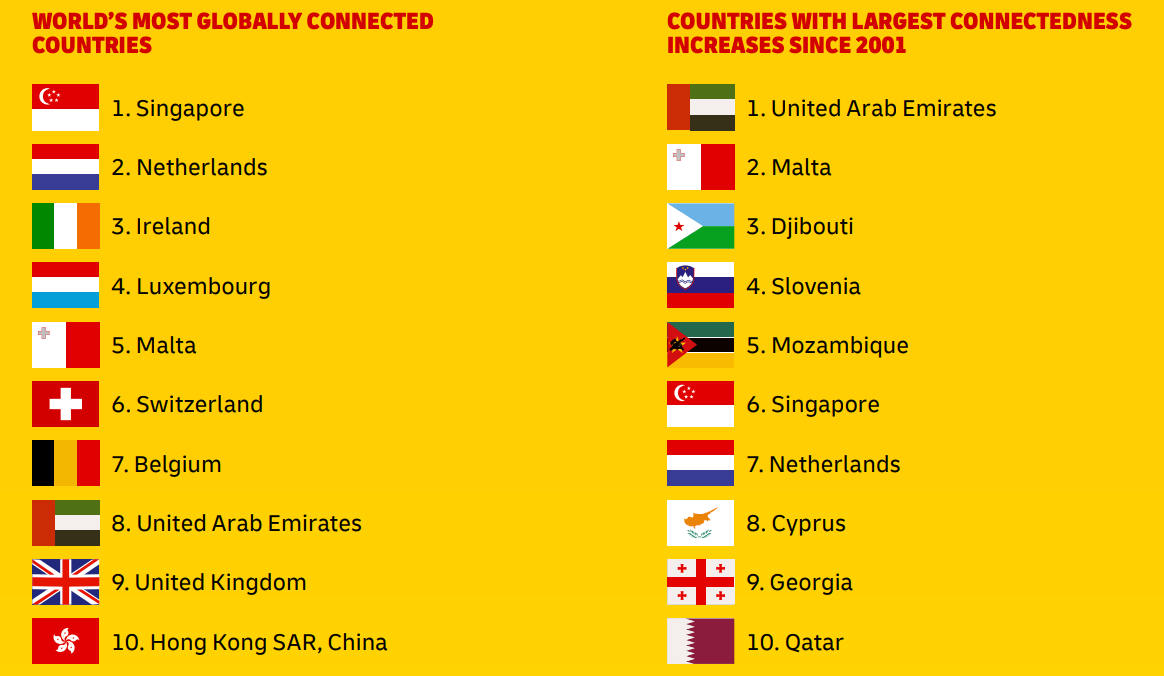
DHL and New York University's Stern School of Business recently released the "DHL Global Connectedness Report 2024," which found Singapore as the most globalised country, followed by the Netherlands. Hong Kong also joined the top 10 ranking of the world's most globally connected markets.
The DHL Global Connectedness Report — which tracks the state and trajectory of globalisation across 181 countries and territories — said Singapore ranked first on 'depth' as it has large international flows relative to the size of its domestic economy, due in part to its public policy to effectively integrate itself into the global economy.
Singapore has also topped the charts on the trade and capital pillars, with its total merchandise trade between 2019 and 2022 jumping 33% from approx. EUR701 billion to EUR937 billion (S$ 1,022.2 billion to S$ 1,365.4 billion).
"Singapore has invested heavily in strengthening our physical and digital connectivity to the world because trade is our lifeblood," said Ih-Ming Chan, executive vice president of the Singapore Economic Development Board.
"We continue to enhance our connectivity and trade links to remain a critical and trusted node in global supply chains, facilitating international trade and flows of capital, information and talent," he added, noting that Singapore looks forward to partnering with global companies seeking a launchpad for business growth and supply chain expansion in Asia-Pacific and beyond.
Following Singapore are the Netherlands and Ireland, ranking second and third, respectively.

[Source: DHL]
The report also placed Hong Kong at the 10th spot — which DHL noted reaffirms the city's position as a gateway for flows between Mainland China and the rest of the world.
DHL said this signals the "growing importance" of the Greater Bay Area along with Macau's advance in ranking.
"Amid global challenges, Hong Kong remains resilient and continues to play a crucial role in facilitating trade between Asia and the rest of the world, as evident from its high ranking on trade and capital pillars," commented Andy Chiang, senior vice president and managing director of DHL Express Hong Kong and Macau.
"The recent expansion of our Central Asia Hub at the Hong Kong International Airport reaffirms our belief in the city's important role as an international aviation hub to further trade flows," he added, noting that DHL will continue to leverage its global network and infrastructure to bolster interconnectivity and extend the market reach for our customers.
Intra-Asia trade flows remain strong
The report also found evidence showing that markets in Asia Pacific are strongly connected with each other in the region, with at least 70% of the countries in Asia Pacific having strong flows with their Asian counterparts.
"Looking at these countries' top 10 connections, six or more are with an Asia Pacific market, citing robust intra-Asia trade," DHL said.
It added that the Asian region is also closely connected with the West, with many of them having the United States or United Kingdom as their top 10 connections.
The DHL Global Connectedness Report also found that 143 economies became more globally connected, while only 38 saw their levels of connectedness decline.
"Further evidence shows that Europe is the world's most globally connected region, followed by North America and the Middle East & North Africa," it said.
The report further revealed that globalization reached a record high in 2022 and remained close to that level in 2023 – despite a series of global shocks over the past decade, including the Covid-19 pandemic, wars in Ukraine and Gaza, the US–China trade conflict, and the UK's withdrawal from the EU.
The report said evidence strongly rebuts the notion that the growth of global flows has gone into reverse.
"Trade growth played a crucial role in boosting global connectedness. The share of global output traded internationally was back to a record high level in 2022. After a slowdown in 2023, trade growth is forecast to accelerate in 2024," DHL's report said.
It added that the globalization of information flows has been especially strong over the past two decades, even though the latest data show a stall in their growth, partly due to less research collaboration between the US and China.
"Corporate globalization is rising, with companies expanding their international presence and earning more sales abroad," it further said, noting that the report affirms the considerable potential to continue growing global flows.
"We continue to see the resilience of globalization and its profound impact on cross-border trade between Asia and the rest of the world. Trade demands within Asia also remain strong due to the establishment of several trade agreements," said Ken Lee, CEO for Asia Pacific, DHL Express, on the findings for the region.
"As a trade facilitator, we firmly believe that globalization is a powerful force that has huge potential to reinvigorate economic growth," he added, noting that DHL will leverage its global network to boost interconnectivity and enhance opportunities for our customers.
Globalisation has not given way to regionalisation
Further, the report shows that predictions of a global shift from globalization to regionalization are not – at least yet – borne out in patterns of international flows.
"In fact, most international flows are taking place over stable or even longer distances, with a declining share happening inside major geographic regions," it said.
The report added that in the realm of trade, only North America shows a clear shift to more regionalized trade patterns.
"Deglobalization is still only a risk, not a current reality," says Steven Altman, senior research scholar and director of the DHL Initiative on Globalization at NYU Stern's Center for the Future of Management.
"Geopolitical threats and public policy shifts have led many to predict a fracturing of the world economy along geographic or geopolitical lines, or even a retreat from international to domestic business. But the latest data still show that international flows are growing, and very few countries are cutting ties with their traditional counterparts."
"It is important to recognize the resilience of global flows because a lopsided focus on the threats to globalization could make deglobalization a self-fulfilling prophecy," Altman added.
Meanwhile, the report also found that although US-China ties have diminished, and Russia's shows an unprecedented decline in global connectedness, there is "no wider split" of the world economy between rival blocs.
"The DHL Global Connectedness Report also shows that US-China ties continue to diminish, with the shares of both countries' flows involving each other decreasing by about one-quarter since 2016. However, both countries remain significantly connected, demonstrating larger flows than almost any other pair of countries," the report said.
It added that Russia and Europe have decoupled, resulting in Russia facing an unprecedented drop in connectedness, more than twice as much as any previous decline on record among the world's 20 largest economies.
Published regularly since 2011, the DHL Global Connectedness Report provides reliable findings on globalization trends by analyzing 15 types of international trade, capital, information, and people flows.
The 2024 edition is based on almost nine million data points and ranks the connectedness of 181 countries, accounting for 99.7% of the world's gross domestic product and 98.7% of its population.
The report was commissioned by DHL and authored by Steven A. Altman and Caroline R. Bastian of New York University Stern School of Business.



